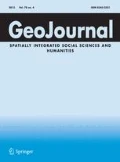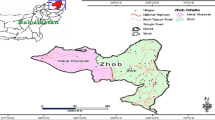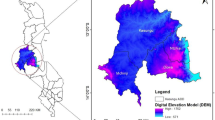Abstract
Jordan is a food-deficit country. Jordan’s population reached approximately 10 million in 2019 and has an annual growth rate of 3.3%. This increase will exert heavy pressure on the kingdom’s fragile natural resource base. The total imports of food commodities still exceed exports, so Jordan is a deficit country with respect to its food supply chain. Data from the Marfraq governorate were used to evaluate the effect of drought on food security in Jordan. This governorate was chosen because most of its land receives low levels of precipitation. The crops selected for analysis were rain-fed crops: olives, wheat, and barley. The precipitation data series were examined for normality distribution, and they were found to be normally distributed. Six drought severity classes were estimated by the Mafraq Governorate during 1995–2017. The highest drought occurrence was near normal drought (15 observation years), followed by moderate drought (3 years), extreme drought (2 years), and very wet and moderately wet (1 year each). The quantitative analysis for the effect of a drought occurrence on crop production was estimated using a regression equation with the assumption of increasing the average temperatures by 1 °C, 2 °C, and 3 °C. A conceptual model was designed to evaluate the impact of agricultural drought on some components of food security in Jordan. The standardized regression coefficients were estimated using the path analysis method. The total effect of drought on food availability was 0.68 standard deviations; the effect for food access was 7.01 standard deviations, and food utilization was 14.63 standard deviations. Climate change, especially drought occurrence, has a negative effect on food security. Crop yields are reduced with high temperatures. Additionally, weeds cover the land, and pest numbers increase, causing more damage. Crop production decreases substantially with low precipitation levels or long droughts. A drought’s indirect effects are evident through changes in irrigation water availability. The main purpose of this research is to understand the impact of drought on food security in Jordan by evaluating the drought effect on agricultural production and sociodemographic-economic aspects.Please confirm if the author names are presented accurately and in the correct sequence (given name, middle name/initial, family name). Author 2 Given name: [Mohammad Samir] Last name [El-Habbab]. Also, kindly confirm the details in the metadata are correct.yes


Similar content being viewed by others
Data availability
The datasets used and/or analyzed during the current study are available from the corresponding author on reasonable request.
References
Chhogyel, N., & Kumar, L. (2018). Climate change and potential impacts on agriculture in Bhutan: A discussion of pertinent issues. Agriculture & Food Security, 7, 79. https://doi.org/10.1186/s40066-018-0229-6
Department of Statistics (DOS). (2019). Population yearbook. Department of Statistics (DOS). Retrieved June 4, 2020, from http://dosweb.dos.gov.jo/population/population-2/
Discussion Paper for the UNDP-DDC/BCPR and UN - ISDR Expert Workshop Drought Risk and Development Policy, January 31–February 2, 2005, Nairobi.
Du, X., Jin, X., Yang, X., Yang, X. H., Xiang, X. M., & Zhou, Y. K. (2015). Spatial-temporal pattern changes of main agriculture natural disasters in China during 1990–2011. Journal of Geographical Sciences, 25, 387–398.
Economic and Social Commission for Western Asia (ESCWA). (2005). Vulnerability of the region to socio-economic drought—ESCWA WATER DEVELOPMENT REPORT 1. United Nations. Retrieved June 4, 2020, from https://www.unescwa.org/publications/publications-list?field_publication_type_tid=576&shs_term_node_tid_depth=9&field_sdgs_tid=15415&field_publication_year_value%5Bvalue%5D%5Byear%5D=2005&combine=
Enenkel, M., See, L., Bonifacio, R., Boken, V., Chaney, N., Vinck, P., You, L., Dutra, E., & Anderson, M. (2015). Drought and food security—Improving decision-support via new technologies and innovative collaboration. Global Food Security, 4, 51–55.
Food and Agricultural Organization (FAO). (1999). Salient trends in world agricultural production, demand, and trade and food security. Paper 1. FAO symposium on agriculture, trade and food security: Issues and options in the forthcoming WTO negotiations from the perspective of developing countries, Geneva. 23–24 September.
Food and Agricultural Organization (FAO). (2015). Sustainable development goals. Food and Agricultural Organization (FAO).
Gabiña, D. (2015). Drought management guidelines in the Mediterranean Region. Instituto Agronómico Mediterráneo de Zaragoza, CIHEAM.
International Institute for Sustainable Development (IISD). (2013). Climate resilience and food security: A framework for planning and monitoring. International Institute for Sustainable Development. Retrieved July 6, 2020, from http://www.iisd.org/pdf/2013/adaptation_CREFSCA.pdf
Izraelov, M., & Silber, J. (2019). An assessment of the global food security index. Food Security, 11, 1135–1152. https://doi.org/10.1007/s12571-019-00941-y
McKee, T. B., Doesken, N. J., & Kleist, J. (1993). The relation of drought frequency and duration to time scales. In Proceedings of the eighth conference on applied climatology (pp. 179–184). American Meteorological Society.
Ministry of Agriculture. (2010). Agriculture Yearbook. Ministry of Agriculture. Retrieved June 4, 2020, from http://www.moa.gov.jo/ebv4.0/root_storage/ar/eb_list_page/%D8%A7%D9%84%D8%AA%D8%BA%D9%8A%D8%B1%D8%A7%D8%AA_%D8%A7%D9%84%D9%85%D9%86%D8%A7%D8%AE%D9%8A%D8%A9_%D9%81%D9%8A_%D8%A7%D9%84%D8%A7%D8%B1%D8%AF%D9%86_%D9%88%D8%AA%D8%A7%D8%AB%D9%8A%D8%B1%D9%87%D8%A7_%D8%B9%D9%84%D9%89_%D8%A7%D9%84%D9%82%D8%B7%D8%A7%D8%B9_%D8%A7%D9%84%D8%B2%D8%B1%D8%A7%D8%B9%D9%8A.pdf
Qtaishat, T., Al-Karablieh, E., AlAdaileh, H., & El-Habbab, M. (2019). Drought-management policies and institutional mandate in Jordan. Paper presented on: 1st international conference on sustainable energy-water-environment nexus in desert climate—QEERI, December 2019.
Rub, D., & Pepukai, C. (2020). Drought impacts IV: Food security. GRoW-Globe Drought.
Shi, W., & Tao, F. (2014). Spatio-temporal distributions of climate disasters and the response of wheat yields in China from 1983 to 2008. Natural Hazards, 74, 569–583.
Wilhite, D. (2000). What is drought—Understanding and defining drought. Universityof Nebraska.
Acknowledgements
The Researchers would like to Acknowledgement the Ministry of Agriculture, and the Ministry of Water and Irrigation in Jordan for providing us with the most data regarding the drought, production, and water availability.
Funding
This manuscript is not funded from any organization.
Author information
Authors and Affiliations
Contributions
TQ collected, analyzed and interpreted the data regarding the Drought and Food Security (Jordan Case Study). SH performed the model of Drought and Food Security, and was a major contributor in writing the manuscript. DB helped in Literature Review and set up the model. All authors read and approved the final manuscript.
Corresponding author
Ethics declarations
Competing interests
The authors declare that they have no competing interests.
Ethical approval
Not applicable.
Consent to participate
Not applicable.
Consent for publication
Not applicable.
Additional information
Publisher's Note
Springer Nature remains neutral with regard to jurisdictional claims in published maps and institutional affiliations.
Rights and permissions
About this article
Cite this article
Qtaishat, T., El-Habbab, M.S., Bumblauskas, D.P. et al. The impact of drought on food security and sustainability in Jordan. GeoJournal 88, 1389–1400 (2023). https://doi.org/10.1007/s10708-022-10702-8
Accepted:
Published:
Issue Date:
DOI: https://doi.org/10.1007/s10708-022-10702-8




